Big Red Book
Celebrating television's This Is Your Life
Brian RIX (1924-2016)
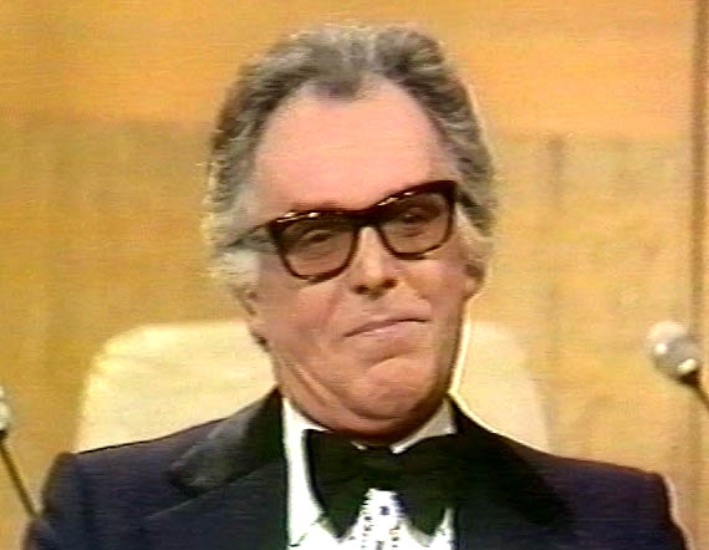
THIS IS YOUR LIFE - Brian Rix, actor-manager and charity campaigner, was surprised by Eamonn Andrews during a charity presentation at London's Her Majesty's Theatre.
Brian, who was born in Cottingham, formed his own theatre company in 1947 after gaining experience with Donald Wolfit's Shakespeare Company and working in repertory theatre, in between periods of serving with the RAF. His long association with the Whitehall Theatre began in 1950 where his company, which specialised in farces, resided for 16 years, before moving to the Garrick Theatre, breaking many West End records in the process.
His farces were regularly broadcast on BBC Television during the 1950s and 1960s, and were highly successful, with viewing figures often reaching 15 million. In January 1977, after 27 years of presenting and appearing in stage and television productions, Brian joined a theatre-owning production company partly run by Ray Cooney and himself, while continuing to be an active campaigner for disability causes.
Brian Rix was a subject of This Is Your Life on two occasions – previously surprised by Eamonn Andrews in September 1961 at a friend's house party in Surrey.
"Good lord! It's been a put up job!"
programme details...
- Edition No: 465
- Subject No: second timer
- Broadcast date: Wed 13 Apr 1977
- Broadcast time: 7.00-7.30pm
- Recorded: Wed 23 Mar 1977
- Venue: Euston Road Studios
- Series: 17
- Edition: 25
on the guest list...
- Ray Cooney
- John Chapman
- Derek Royle
- Larry Noble
- Wally Douglas
- Clive Exton
- Andrew Sachs
- Michael Pertwee
- Joanna Lumley
- Elspet Gray - wife
- Louisa - daughter
- Jamie - son
- Jonathan - son
- Nora - sister
- Malcolm - brother
- Sheila Mercier - sister
- David Stross
- Bill Turvey
- Tim Manderson
- Tommy Watt
- Leslie Crowther
- Jean Crowther
- Rosemary Ayres
- Wes Hall Filmed tribute:
- Dickie Henderson
related appearances...
- Dickie Henderson - Feb 1971
- Alfred Marks - Nov 1971
- Ray Cooney - Jan 1975
- Patrick Cargill - Dec 1976
- Nicholas Parsons - Mar 1978
- William Franklyn - Apr 1978
- Terry Scott - Nov 1978
- Andrew Sachs - Jan 1980
- Brian Johnston - Nov 1982
- Sheila Mercier - Nov 1985
- Peggy Spencer - Mar 1993
- Leslie Crowther - Nov 1994
- The Night of 1000 Lives - Jan 2000
production team...
- Researcher: Tony Lee
- Writers: Tom Brennand, Roy Bottomley
- Directors: Terry Yarwood, Anthony Parker
- Producer: Jack Crawshaw
- names above in bold indicate subjects of This Is Your Life
first tribute
spotlight on the stars
surprised again!
keeping it in the family
a celebration of a thousand editions
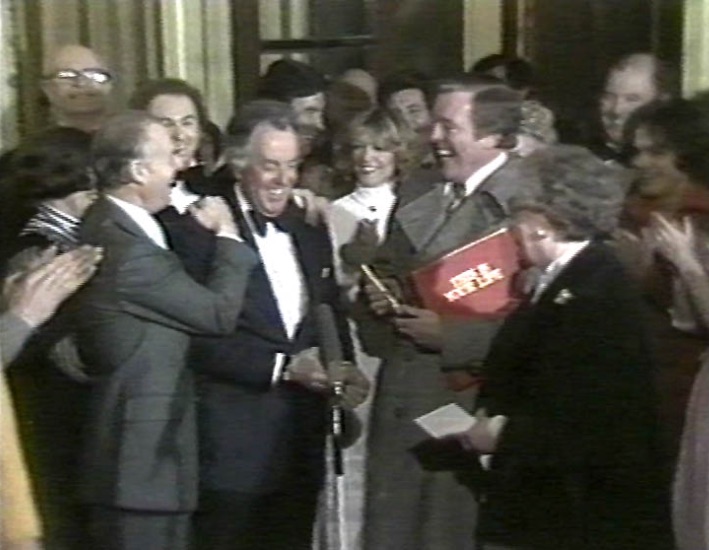
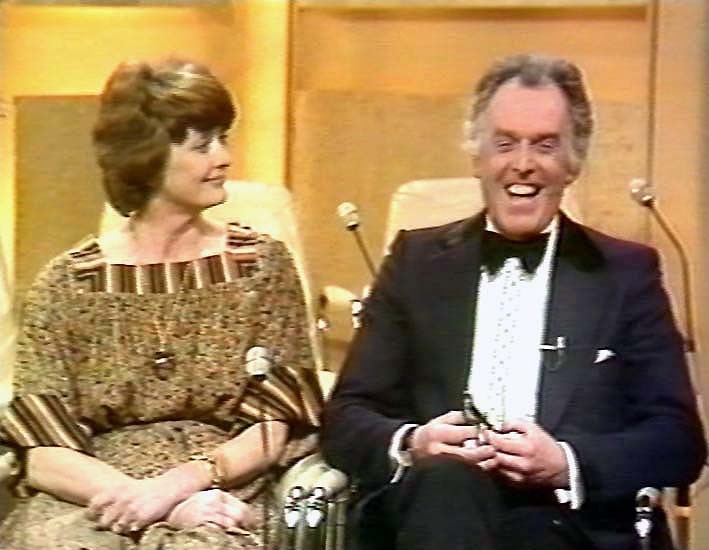
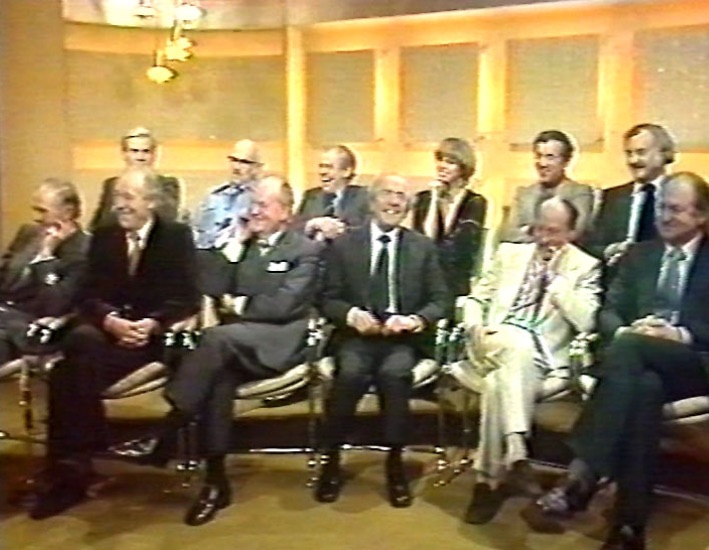
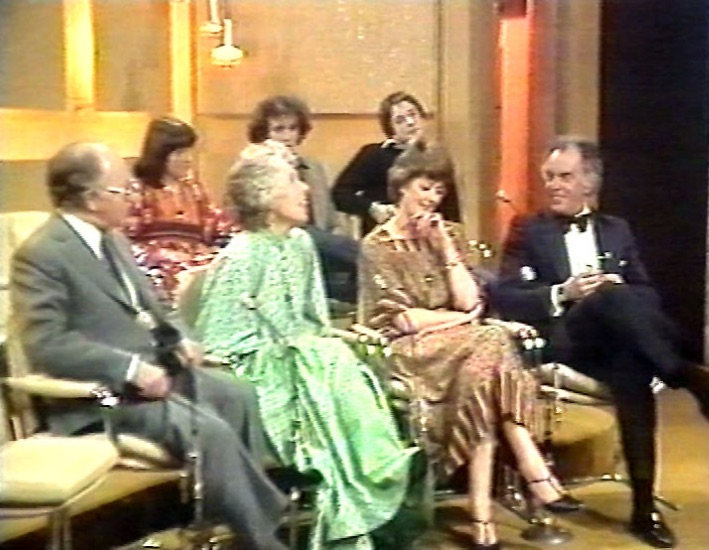
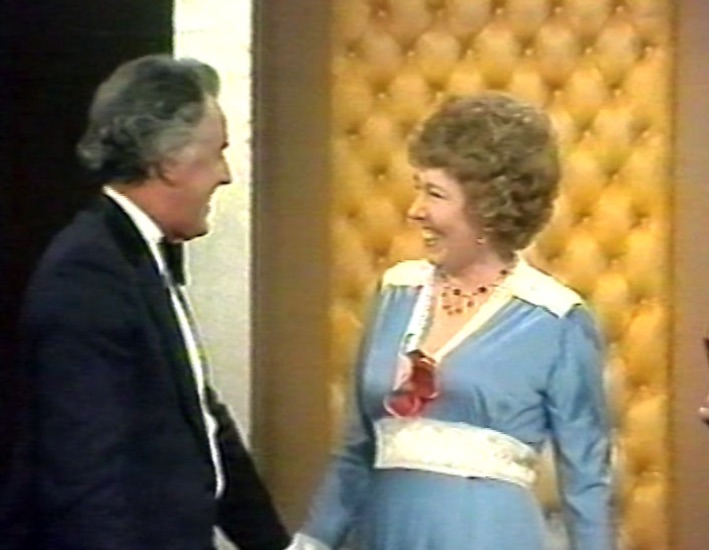
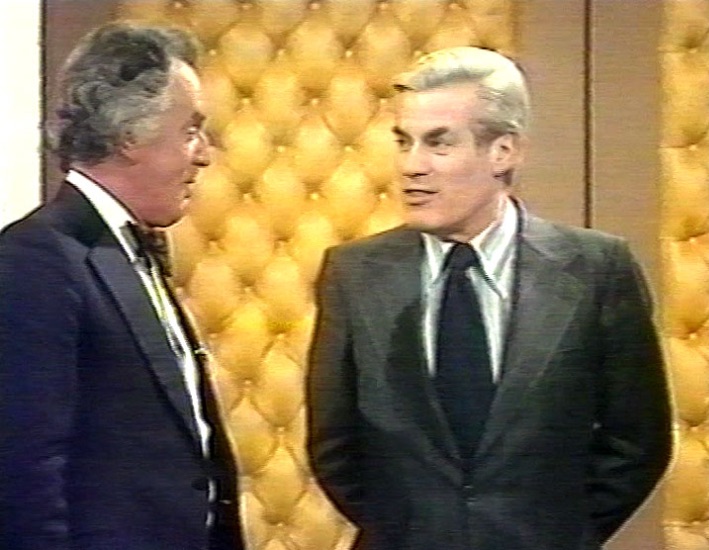
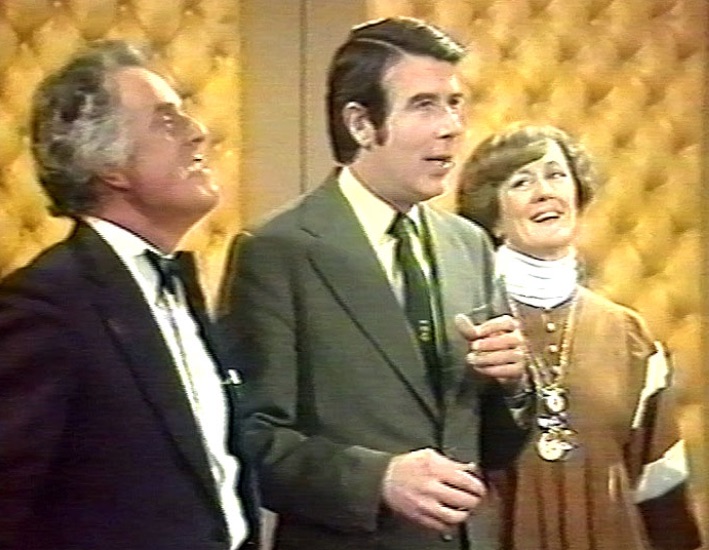
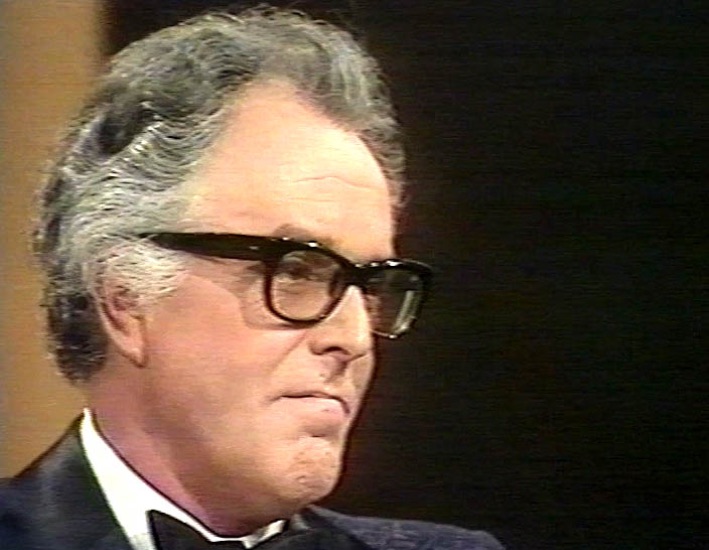
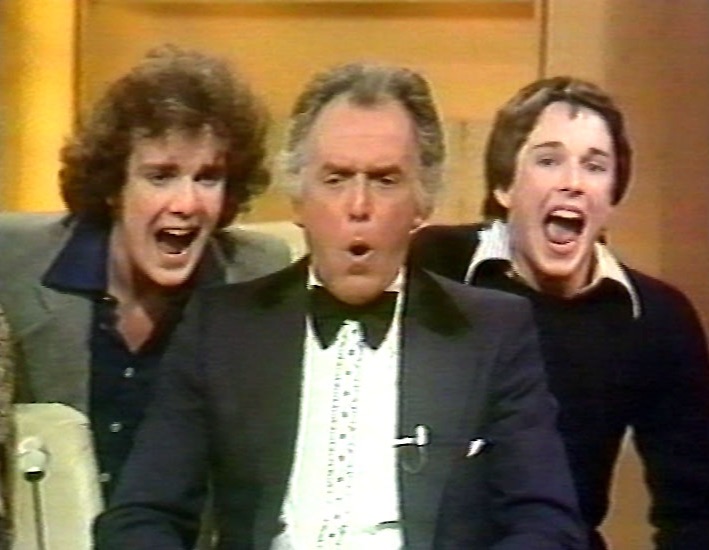
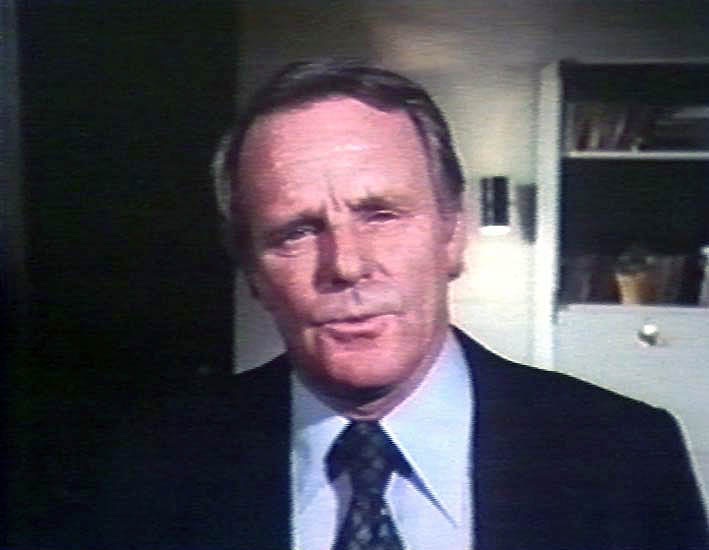
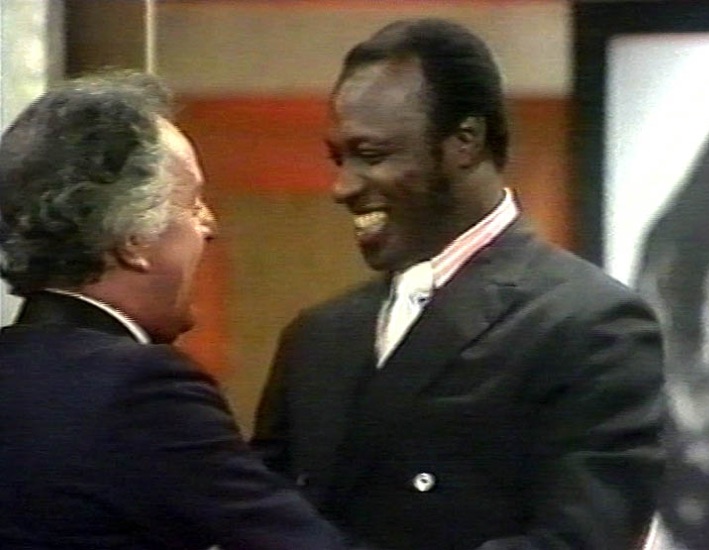
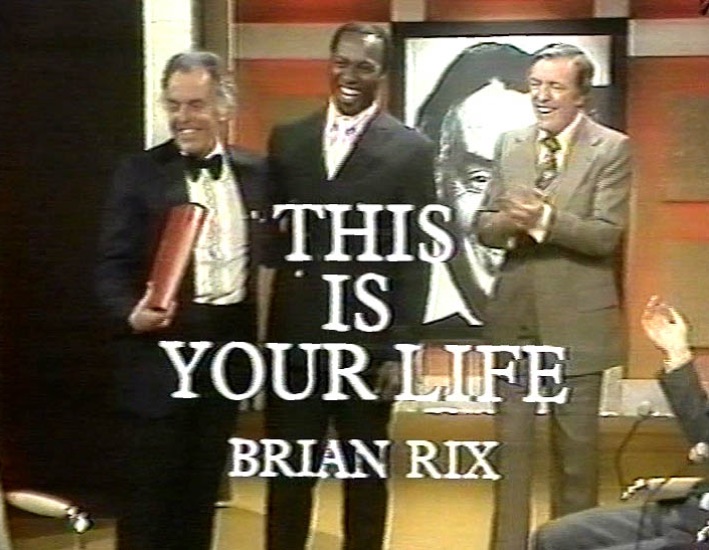
Screenshots of Brian Rix This Is Your Life
"I have no additional stories other than those published - except my wife turned down a third appearance when I went to the Lords in 1992. No third time lucky!"
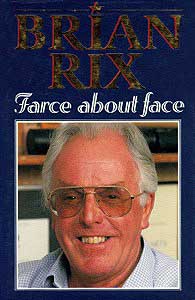
In spite of all the runic rumblings issuing forth from the rehearsals of Fire Angel, I went along to the first preview on March 22nd 1977 with some anticipation. Surely it couldn't be as bad as all that? I was soon to find out. First I had to hand over a cheque, in the full glare of television publicity, to the Spina Bifida Association. I was doing my stuff in the Circle Bar, with the cameras rolling, when suddenly a very familiar face hove into view and an equally familiar red book was thrust into my hands. For the second time in sixteen years I had been completely lulled into innocent participation as the subject of This is Your Life, and the familiar face belonged, of course, to the late – lovely – Eamonn Andrews. Now to be done once is a great honour, but to be done twice is a rare privilege, and I can honestly say I enjoyed the second time more than the first, probably because I was getting used to it! I must explain that, apart from being the subject twice, I had also appeared in umpteen programmes as a contributor. Dickie Henderson, David Jacobs [Bigredbook.info editor: Brian does not appear as a guest on David Jacobs's edition of This Is Your Life], Nicholas Parsons, Brian Johnston, William Franklyn, Alfred Marks, Andrew Sachs, Leslie Crowther and my sister, Sheila, all had heard stories from me which told of their many talents – and there were others, too, but for the life of me I can't remember all their names. My apologies, but unfortunately I never kept the very kind letters which Eamonn used to write to all contributors after a programme, so my list is incomplete. I think I've been on This Is Your Life some fourteen times in all, so you can see why I was getting used to it.
Apart from familiarity, the second programme was somewhat jollier than the first. To begin with, our children had all grown up and Jonathan was able to tell some far-fetched story about his dad, but in the first programme he'd been pushed on in a pram by Leo Franklyn, dressed as a nanny. All the other kids who had been born to members of the cast whilst we were at the Whitehall were also on that first programme – there's something very moving about seeing so many children all wishing you well (which was the tear-jerking climax), quite apart from the fact you feel under an even greater obligation to their parents. I recall a picture of me, with sweat running down my forehead and tears running down my cheeks. Not a pretty sight. At least I avoided that in part two. Then again, my parents were around for the first programme, having just celebrated their Golden Wedding anniversary. They trotted on, with my mother leading the way, as was her wont, and then my father was asked by Eamonn what he thought of his son's achievements. Now you're supposed to speak the lines which you've carefully rehearsed over the last two days, but my father would have none of it. "Not bad," was the laconic reply and that was all Eamonn could get out of him, for all his prompting. I'm glad to say my mum made up for my dad's shortcomings, and prattled on about me quite happily until Eamonn had to draw matters to a close – otherwise she would have caused an over-run, and that would not have done. Elspet was a tower of strength on both occasions, firmly holding my hand and willing me not to make too much of a fool of myself in front of such a vast audience. And on the second occasion, as I say, my stiff upper lip never wavered. In fact, I laughed far too often. Nerves, I hasten to add.
Who else came on in programme two? Well, a stream of old friends and colleagues to begin with, led by Ray Cooney and John Chapman. Then came a very funny actor, Derek Royle, who had been such a success in She's Done It Again, portraying a doddery old Professor Hogg, a character he later developed with author Michael Pertwee into a television series, Hogg's Back. After Derek, a face from the old days, Larry Noble, who seemed to be a fixture at the Whitehall. Indeed, he was, leaving just before the end of Chase Me, Comrade! to be succeeded, strangely enough, by Derek Royle.
Then on walked Wallace Douglas, the director of so many of my productions, followed by author Clive Exton (he'd been Clive Brooks when he was with me as an actor) and Clive had subsequently won many awards for his television plays, apart from writing The Crezz which had starred Elspet and Joss Ackland amongst others. Michael Pertwee brought up the rear of this male phalanx and then came the only member of the distaff side in the first onslaught, Joanna Lumley, looking as glamorous as ever. Joanna was originally in Don't Just Lie There, Say Something as one of a quartet of beautiful ladies, but had gone on to greater things (well, greater exposure, anyway) particularly in the last series of The Avengers on the telly.
Now it was the turn of the family to appear, led, of course, by Elspet. Eventually Jamie (then at university) and Jonty (still at St Paul's) were to be seen on either side of me whilst we went through the animal impressions we used to do, whilst holidaying in Spain, and which were so lifelike we started all the dogs barking. How that came to be an integral part of This Is Your Life I will never know, but I shall always remember Jamie's gibbon, Jonty's chimp and my turkey, plus horses neighing, as being a very noisy interlude in the programme.
My sister Nora and brother Malcolm were next, whilst my other sister Sheila was interviewed on film at the fictional, but beautiful, Emmerdale Farm. Then she, too, joined the merry throng in the flesh, as it were. Two old school friends from Bootham followed, David Stross and Bill Turvey, my ex-dentist. Bill (real name, Brian), his wife Ann and Elspet and I have remained close friends throughout our married lives, which must say something for his expertise as a dentist, for I was always an arrant coward when it came to my visits and yet our friendship has continued in spite of all extractions and excavations.
Tim Manderson followed, telling the story of how he once knocked me down at the Opera House in Harrogate, because I would insist on whistling in the dressing-room. That, of course, is one of the better-know superstitions in the theatre and it is also extremely irritating, too. I was senior to Tim and whistled just to annoy him. At first he asked me politely to desist. I continued to whistle. He then said he would knock me down if I didn't stop. I didn't – so he did. We've been close friends ever since.
Jazz pianist Tommy Watt came on to remind me of our early days in the RAF, as well as the big band we formed together in the late 1950s. Or rather, Tommy formed – I just put up the money. We negotiated a long series of BBC broadcasts and landed a recording contract with Parlophone, then managed by the man who went on to fame and fortune recording the Beatles, George Martin. But it was a pick-up band, the players coming from other big bands – like Ted Heath and Geraldo – and eventually they complained to the BBC, and it was all over. But it was great to dream of being Count Basie – even though I can't play a note. Michael Pertwee generously praised my attitude to other actors getting laughs: in other words, I didn't mind as long as the laughs were there, whilst Leslie Crowther said that I didn't mind as long as the laughs were coming from my fellow actors – as I had a dreadful habit of trying to "corpse" my friends on stage. Absolutely true, particularly at bad matinees, and absolutely unforgivable at any time. Leslie reminded me of the lengths to which I would sometimes go, and told the tale of one performance when he and Elspet were on stage in Let Sleeping Wives Lie, whilst I was off-stage changing into pyjamas. "Then," said Leslie, "this monster (meaning me) brought forth a dustbin (used for off-stage crashes), stuffed a soda siphon down his pyjama pants and proceeded to pee in the dustbin, with remarkable accuracy and considerable force – for he was using the siphon, not nature." I remember the din was horrendous. "Well," said Leslie, "that was the end of the scene as far as I was concerned – and as far as Brian was concerned. He enjoyed the joke so much he was literally crying with laughter when it was his turn to come on – and the whole matinee collapsed around our ears." Quite dreadful, and if any reader was in the Garrick Theatre for that particular matinee, I can only offer my abject apologies.
Dickie Henderson brought the programme to its penultimate phase, but he was on film, being in America at the time.
His opening gag was a typical Dickie one-liner. Looking straight into camera he said: "What can I say about you, Brian that you haven't already said about yourself?" But after that laugh, he became quite serious and described the work which I had done on behalf of the SOS (the Stars Organisation for Spastics). As most of that work had been many years before, I felt slightly embarrassed at the mention, particularly as Dickie himself, as well as Elspet and Leslie and Jean Crowther, had continued to work just as hard as ever, right up to, and beyond, the date of that particular programme. Dickie reminded us all that, along with Tim Manderson, he was Jonty's godfather. When Jonty was little, he gave him a copy of the Bible and said, "When you've read that, I'll give you another present." Alas, he's no longer with us to live up to his promise, but he was a warm-hearted, generous friend when he was around and a very funny stand-up comedian. Who can forget his rogue microphone-cord act, or the wonderful would-be Sinatra trying to sing, act, light a cigarette and have a drink all at the same time, whilst balanced on a bar stool singing "One for my baby". Wonderful stuff, as was his dancing. A great loss to us all.
And finally, that magnificent West Indian fast bowler, Wes Hall, was whisked on. Or, to give him his present full title, Senator Wesley Hall, Minister for Tourism and Sport in Barbados. How did he come to grace the programme? Well, I first met him way back in 1963 when he and Charlie Griffiths were striking terror into the hearts of England's cricketers. Our paths had crossed on a number of occasions since then, particularly in a match at Lord's in June 1973, when Wes and I joined Elton John, David Frost, Gerald Harper, Michael Parkinson, Peter Cook, Ed Stewart and Ray Barratt in a team organised by Vic Lewis to do battle with Middlesex in aid of Fred Titmus's benefit. I must report that in my fortieth year, I took 2 for 30, made 23 not out and held a blinding catch at backward point, which brought the crowd to its feet and me a bruised hand which had to be seen to be believed. For weeks I bored everyone with the story, which became more and more exaggerated as time wore on. In the end, Wes Hall had delivered the ball at about 90 mph to Mike Brearley who thumped it at about 140 mph to my right, whence I dived and came up clutching the ball which miraculously had stuck to my hand. In fact, I think the batsman was Norman Featherstone and the bowler Ed Stewart, but it makes a better story that way. And it was travelling at 140 mph, in either version – and I did catch it with one hand. So there!
When that particular match was over, I was invited into that holy of holies at Lord's – the Committee Room. I explained that my daughter, Louisa, was with me, but they decided to bend the rules and allow her to accompany me. One of the old boys came up to her, as she sipped her sherry, and guffawed: "You know, my dear, it's a great privilege for you to be here. Normally the only women allowed in are the Queen and the cleaners." One of the great bastions of chauvinism is Lord's. No wonder Her Majesty only goes once a year.
And what about His Honor, Wesley Hall, now Sir Wesley? Well, some three years earlier, Elspet and I were winging our way to the Coral Reef Hotel in Barbados in the company of Leslie and Jean Crowther. "Lucky devils" you may think, but we were going out with a solemn duty in mind: to support our ailing Test team in the Third Test at Bridgetown. Every day during the five days of the Test, small groups of enthusiasts, the four of us amongst them, left our hotels and proceeded by bumpy bus to the ground, there to cheer on the English team. We had a job on the Saturday: with 20,000 people crammed into a ground holding 14,000, a handful of English – even with loud voices like Leslie's and mine – found it difficult to be heard over the din.
We had another noisy reception of a more pleasant kind when Leslie and I did a cabaret at our hotel for the team and their supporters. Several hundred squeezed into a space normally holding less than one hundred, but they were a marvellous audience and we both found difficulty coming off that cramped cabaret floor! Next day we marched up and down the beach proudly receiving plaudits from all and sundry, and as our team went on to achieve a noble draw we felt we must have raised morale somehow. Our morale was considerably lifted too, for our guide and mentor in Barbados was the very same Wes Hall, and going round the island with him was royal progress, indeed. Thus, three years later, thanks to This Is Your Life, we had a chance to repay his hospitality. We took it with both hands. Wes came to stay with us for the rest of his time in London, and we had a marvellous party. All thoughts of the horrors of Fire Angel were driven firmly from our minds, but the reports coming in were definitely depressing.
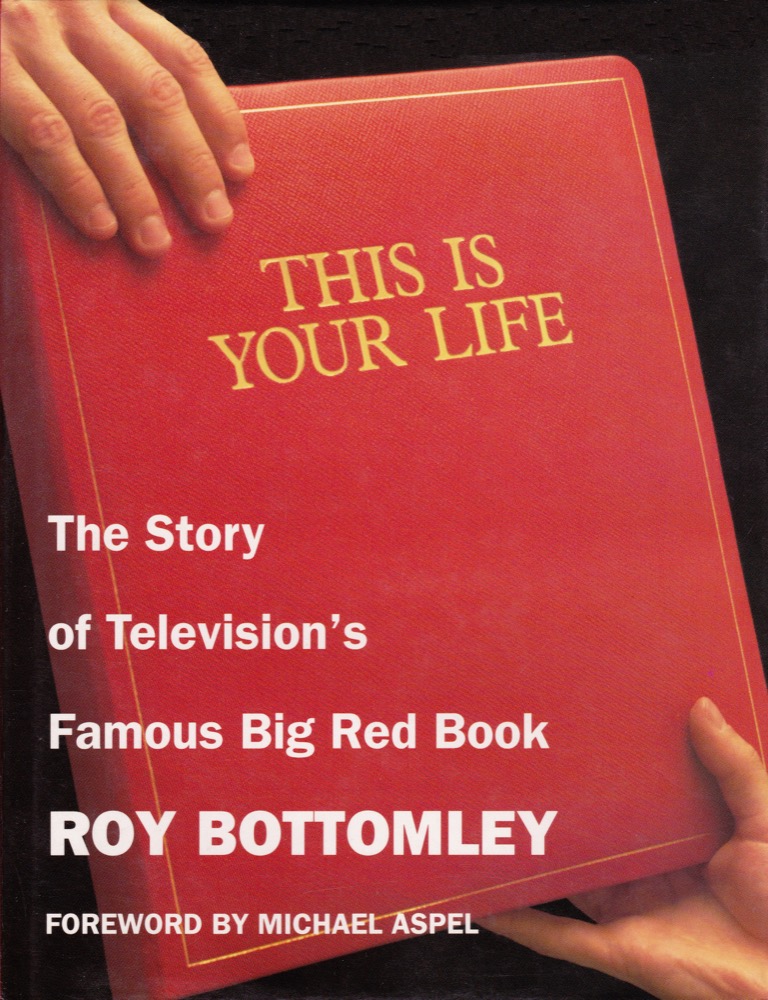
Brian Rix - master of the art of farce - had just made the last of many thousands of West End appearances when Eamonn Andrews surprised him on 23 March 1977, making a charity presentation.
The special team he had worked with over the years were at the studios, including Ray Cooney, John Chapman, Derek Royle, Clive Exton, Andrew Sachs, Michael Pertwee and Joanna Lumley. And, of course, his actress wife Elspet Grey and actress daughter Louisa were there.
Brian, who has a handicapped daughter, is almost as well known for his charity work as for his acting. At the time of his Life he was vice-president of the Stars' Organisation for Spastics, and since 1988 he has been chairman of Mencap, the Royal Society for Mentally Handicapped Children and Adults. His efforts for these organisations have been rewarded with a knighthood in 1986, followed by a peerage in 1992.
Fans of television's long-running series Emmerdale Farm perhaps got a surprise when the character of Annie Sugden turned up - in real life Brian's sister, actress Sheila Mercier.
But the surpise that really hit him for six had nothing to do with the theatre. Cricket is Brian's offstage passion, and his all-time hero West Indies fast bowler Wes Hall. We flew him in for the 'curtain'.
Series 17 subjects
Frankie Howerd | Wilfred Hyde-White | John Blashford-Snell | Mervyn Davies | Pam Ayres | Ivy Benson | Jim WicksJoss Ackland | John Inman | Patrick Cargill | Sheila Hancock | Tom O'Connor | Florence Priest | Tony Britton | Molly Weir
Anthony Quayle | Alfred Pavey | Michael Denison | Mary Chipperfield | Leonard Sachs | Cyril Fletcher | Matt Monro
Tony Greig | John Frost | Brian Rix | Alberto Semprini | Louis Mountbatten